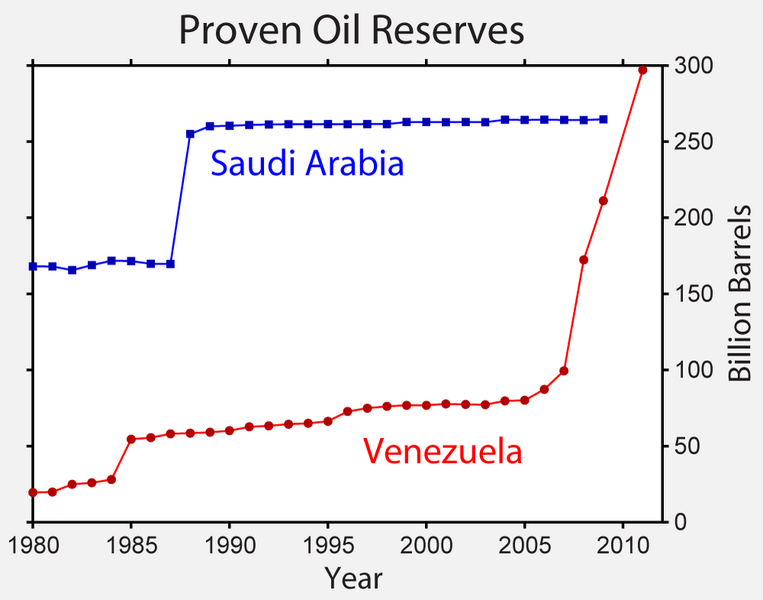Oil sands -- The crude bitumen contained in the Canadian oil sands is described by Canadian authorities as "petroleum that exists in the semi-solid or solid phase in natural deposits. Bitumen is a thick, sticky form of crude oil, so heavy and viscous (thick) that it will not flow unless heated or diluted with lighter hydrocarbons. At room temperature, it is much like cold molasses".[2]
Venezuelan authorities often refer to similar types of crude oil as extra-heavy oil, because Venezuelan reservoirs are warmer and the oil is somewhat less viscous, allowing it to flow more easily.
Reserves
Many countries in the world have large deposits of oil sands, including the United States, Russia, and various countries in the Middle East. However, the world's largest deposits occur in two countries: Canada and Venezuela, each of which have oil sand reserves approximately equal to the world's total reserves of conventional crude oil. As a result of the development of Canadian oil sands reserves, 44% of Canadian oil production in 2007 was from oil sands, with an additional 18% being heavy crude oil, while light oil and condensate had declined to 38% of the total.[13] Because growth of oil sands production has exceeded declines in conventional crude oil production, Canada has become the largest supplier of oil and refined products to the United States, ahead of Saudi Arabia and Mexico. Venezuelan production is also very large, but due to political problems within its national oil company,[14] estimates of its production data are not reliable. Outside analysts believe Venezuela's oil production has declined in recent years,[15] though there is much debate on whether this decline is depletion-related or not.
Oil sands may represent as much as two-thirds of the world's total "liquid" hydrocarbon resource, with at least 1.7 trillion barrels (270×109 m3) in the Canadian Athabasca Oil Sands (assuming a 10% recovery).
In October 2009, the USGS updated the Orinoco oil sands (Venezuela) mean estimated recoverable value to 513 billion barrels (8.16×1010 m3), making it "one of the world's largest recoverable" oil deposits.[16]
Between them, the Canadian and Venezuelan deposits contain about 3.6 trillion barrels (570×109 m3) of recoverable oil, compared to 1.75 trillion barrels (280×109 m3) of conventional oil worldwide, most of it in Saudi Arabia and other Middle-Eastern countries...
Orinoco Belt represent nearly 90% of the known global reserves of extra heavy crude oil, and nearly 45% of the combined crude bitumen and extra-heavy crude oil reserves in the world.
Bitumen and extra-heavy oil are closely related types of petroleum, differing only in the degree by which they have been degraded from the original crude oil by bacteria and erosion. The Venezuelan deposits are less degraded than the Canadian deposits and are at a higher temperature (over 50 degrees Celsius versus freezing for northern Canada), making them easier to extract by conventional techniques.
Although Venezuela's extra-heavy oil is easier to produce than Canada's bitumen, it is still too heavy to transport by pipeline or process in normal refineries. Lacking access to first-world capital and technological prowess, Venezuela has not been able to design and build the kind of upgraders and heavy oil refineries that Canada has. In the early 1980s, the state oil company, PDVSA, developed a method of using the extra-heavy oil resources by emulsifying it with water (70% extra-heavy oil, 30% water) to allow it to flow in pipelines. The resulting product, called Orimulsion, can be burned in boilers as a replacement for coal and heavy fuel oil with only minor modifications. Unfortunately, the fuel’s high sulfur content and emission of particulates make it difficult to meet increasingly strict international environmental regulations.
Further development of the Venezuelan resources has been impeded by political unrest. Venezuela is less politically stable than a country such as Canada, and a two-month strike in 2002–2003 by employees of the state oil company was followed by the dismissal of nearly 20,000 staff. As tensions resolved, strike leaders pointed to the reduction in Venezuela's domestic crude output as an argument that Venezuela's oil production had fallen. However, Venezuela's oil sands crude production, which sometimes wasn't counted in its total, has increased from 125,000 bbl/d (19,900 m3/d) to 500,000 bbl/d (79,000 m3/d) between 2001 and 2006 (Venezuela's figures; IAEA says 300,000 bbl/d).[27][28][29]
[edit]USA
In the United States, oil sands resources are primarily concentrated in Eastern Utah. With a total of 32 billion barrels (5.1×109 m3) of oil (known and potential) in eight major deposits[30] in the Utah counties of Carbon, Garfield, Grand, Uintah, and Wayne. Currently, oil is not produced from oil sands on a significant commercial level in the United States, although the U.S. imports twenty percent of its oil and refined products from Canada, and over fifty percent of Canadian oil production is from oil sands. In addition to being much smaller than the oil sands deposits in Alberta, Canada, the U.S. oil sands are hydrocarbon wet, whereas the Canadian oil sands are water wet. As a result of this difference, extraction techniques for the Utah oil sands will be different than those used for the Alberta oil sands. A considerable amount of research has been done in the quest for commercially viable production technology to be employed in the development of the Utah oil sands. A special concern is the relatively arid climate of eastern Utah, as a large amount of water may be required by some processing techniques.[18] Section 526 of the Energy Independence And Security Act prohibits United States government agencies from buying oil produced by processes that produce more greenhouse gas emissions than would traditional petroleum including oil sands.[31][32]



